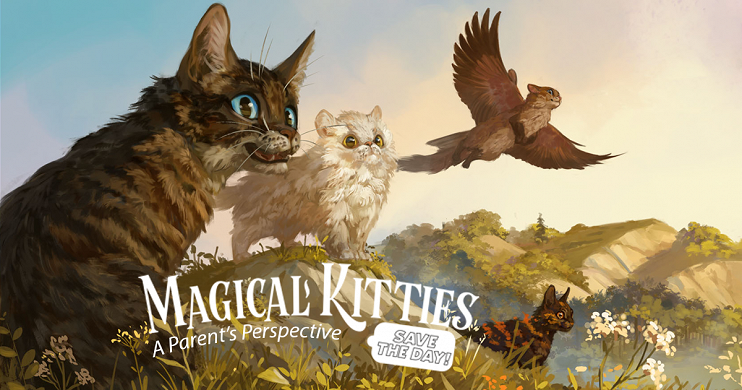Magical Kitties Love Kids with Challenging Behaviors

In Magical Kitties Save the Day, the game's elegantly simple rules make for easy GMing in general. But what if you're running the game for kids with challenging behaviors? I've had LOTS of experience GMing Magical Kitties for wonderful kids with autism, ADHD, and developmental delay … sometimes all in one group! So here are my tried-and-true hints for making your game fun for everyone, no matter what behavior issues your young players have.
Kitties Don't Sit on Chairs
Some kids just can't seem to sit still in a chair to save their life. If you know this is the case ahead of time, then get rid of their chair! Lots of antsy kids are actually happier to stand up at the table, where they can wiggle as much as they want. Or, if you have a child who's liable to spend more time crawling under the table than playing at it, then go with the Montessori method of having everyone sit on the floor. If you know a player is liable to “wander” around the room, then be prepared to use their kitty's Flaw if that player has walked off. If a Lazy kitty just fell asleep, for example, then that lets you delay/skip their turn and go on.
Drawing is Magical
Drawing your kitty is a big part of the game in Magical Kitties Save the Day, both for storytelling and to occupy distractible players. So be sure to give your players pencils and colors, and LOTS of extra paper. After all, if you can get a child's attention by asking them to draw their kitty, then you can keep it by suggesting they also draw their human, or their home, or their neighborhood. What starts as a kitty portrait can even expand into a portrait of their entire kitty krew! Drawing means they're at the table, and hearing what's happening even if they don't seem to be actively participating.
Ditch the Adventure
Forget the idea that you need to have a planned-out adventure all worked out in advance. Or even that you need to make the players do anything plot-related in your session at all. My best games with behavior-challenged kids have been ones where I start by saying, “You wake up from a cat-nap in your home. What do you do?” Then, any time a player looks like they're getting bored, I just turn it around and ask what they think should happen next. Redirection is a GM's secret tool for keeping players involved!
After all, it's really up to the players to tell you how the story goes in Magical Kitties Save the Day, anyway. As the GM, you just describe the setting and they say what they want to do in it. Then, when you get to the the end-of-session questions, they'll quickly realize that doing certain things is better than doing others. They'll figure out that to improve problem ranks and earn experience, they need to find ways to help their humans and to look for their hometown's problems so they can save the day. The questions will make them think of ways to create and engage with the plot on their own, with you facilitating instead of leading.
So forget the adventure prep, and let your players tell the story instead!
Learn to Disassociate
All kids tend to get off track. My most successful GMing strategy has been to learn to zone out and think about other, more interesting-to-me things while the kids digress, talking on and on about their kitties' super-cute toe jam or whatever. Remember, they're HAVING FUN. So just LET THEM HAVE FUN even if you're not so much, because what's fun is often different for kids than for adults. Be flexible and patient, so you can help your players find their own way to enjoy the game.
Limit it to One Hour
I know one hour seems like nothing if you're a gamer used to 4- to 6-hour D&D games. Trust me, though. For kids with attention and behavior issues, one hour is a pretty good run, so don't force it beyond that if they're ready to stop. And even if they say they want to go on, keep an eye out for bickering and call an end to it, or at least declare a snack break, before things go bad. Magical Kitties is purposefully designed to work well with short sessions spread out over time to make a longer series, so make that work for you!
Did Everyone Have Fun?
Lastly, use the "Did everyone have fun?" end-of-session question to your advantage. If the answer is “No,” then don't give the group that experience point. They really will remember to treat each other more kindly next time!
-Michelle Nephew, Co-Owner of Atlas Games
